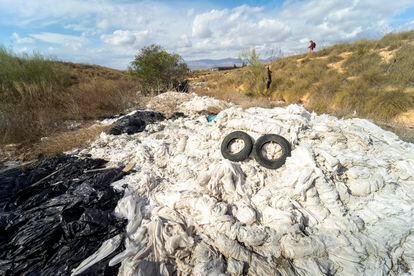An illegal landfill in Madrid. ECOLOGISTS IN ACTION (Europa Press)
The Senate has given the green light to the bill on waste and contaminated soil, which will involve the creation of two new taxes at the request of the European Commission: a fee on single-use plastic containers and another that taxes the deposit of waste in landfills and incineration.
In addition, through two amendments promoted by the PSOE, the Government modifies the Water Law in order to recover the hydroelectric canon that the electricity companies must pay and that was annulled by the Supreme Court.
As modifications have been included, Congress will have to vote again on the bill for it to enter into force, which further delays its application.
This law - which has gone ahead in the Senate thanks mainly to the favorable votes of the PSOE and the Basque nationalists and the abstention of the PP - has to help Spain correct the course in the management of its waste, because the country has a problem with its waste and poor waste treatment is in the crosshairs of Brussels.
The EU set recycling targets for 2020 more than a decade ago: all members should reach that year with a municipal waste recycling rate of 50%.
But Spain stayed in 2020 at 36%, according to Eurostat data.
Far from slackening the goals for the coming years, Europe has set even tougher goals and in 2030 it should reach 60% and in 2035, 65%.
The law will also mean that from its entry into force the marketing of certain single-use plastic utensils such as straws, glasses and plates will be banned, and the addition of microplastics to cosmetics or cleaning products will be prohibited.
The rule also contemplates the obligation for bars to offer free non-bottled water to customers, the promotion of bulk sales in large commercial areas and offers legal protection to municipalities so that they can prohibit smoking on the beaches.
More information
War on plastic, two taxes and free water in bars: why does Spain need a new waste law?
But what has generated the most problems in its processing are the taxes that are included in the standard.
In the case of the tax on dumping and incineration, which seeks to reduce the amount of rubbish that is not recycled in Spain, a dozen autonomous communities have charges of this type.
But the European Commission has urged the government to create a state tax to prevent waste from traveling between regions to avoid those fees.
Catalonia is one of the communities that has had its own canon for years.
And, although an amendment has been approved in the Senate so that the autonomies that already have this tax figure maintain practically all the management of the tax, both ERC and Junts per Catalunya have voted against the law, as they already did in Congress .
They consider that the new state rate represents a "recentralization", in the words of Xavier Castellana i Gamisans, from ERC.
The spokesman for the PSOE, Fernando Lastra, however, recalled that the European Commission has asked Spain through two early warning reports for this national tribute.
The other tax, which is levied on non-reusable packaging, is newly created and is also established at the request of the European Union, since it is included in the new directives that seek to reduce plastic pollution.
But, unlike the rest of the law, both this tax and that of landfills will not come into force as soon as the rule is published in the
Official State Gazette
.
The PP has made its abstention from the law conditional on the application of the taxes being delayed until 2023. During the process in Congress, an attempt has been made to advance this application to 2022, since that was what had been set in the recovery plan that it presented. the Executive before the Commission, explain socialist sources.
But the PSOE has not managed to add the necessary votes.
Another of the issues that has been controversial in the processing in the Senate has been that referred to the veto of the use of bisphenol A in packaging, a chemical compound that is in the spotlight for its repercussions on health.
The European Commission will shortly present the roadmap for the elimination of the use of thousands of chemical compounds, including all bisphenols, and will set a timetable for that eradication.
The bill that came out of Congress directly established the prohibition of bisphenol A in packaging.
Now, in an amendment approved in the Senate, the restriction of this substance is advocated based on what is established in the European regulation that sets the guidelines for its use.
Tatiana Santos, from the organization European Environment Office,
Reintroduction of the hydroelectric canon
The Executive of Pedro Sánchez has used the processing in the Senate of the waste law to try to reintroduce the hydroelectric canon, a rate created by the PP Government in 2015 and that should be paid by the companies that own the hydroelectric plants located in the public domain hydraulic.
However, the Supreme Court annulled several precepts of this canon, which has forced the Government to return 1,908 million euros to the electricity companies.
The Ministry for the Ecological Transition is now trying to amend this fiasco to try to save the canon with a reform of the Water Law that was not undertaken at the time and that led to the Supreme Court ruling.
You can follow CLIMA Y MEDIO AMBIENTE on
and
, or sign up here to receive
our weekly newsletter

